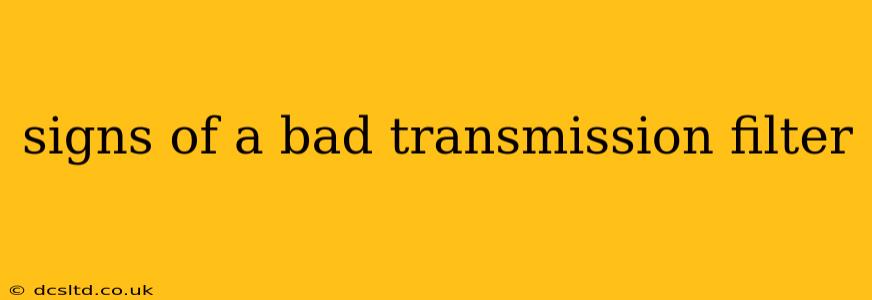A failing transmission filter can lead to significant problems for your vehicle, ultimately resulting in costly repairs. Catching the issue early is key, and recognizing the signs can save you time and money. This guide will walk you through the common symptoms of a failing transmission filter, helping you understand what to look for and when to seek professional help.
What Does a Transmission Filter Do?
Before diving into the symptoms, it's helpful to understand the function of a transmission filter. It's a crucial component of your vehicle's automatic transmission system, acting as a sieve to remove contaminants like metal shavings, debris, and worn clutch material from the transmission fluid. A clogged filter restricts fluid flow, hindering the transmission's ability to function properly. This leads to a range of problems, making regular filter changes (as recommended in your owner's manual) crucial for maintaining your vehicle's health.
Common Signs Your Transmission Filter Needs Replacing
Several indicators signal a failing transmission filter. These symptoms often overlap, making it crucial to pay attention to the bigger picture.
1. Slipping or Delayed Shifting
One of the most noticeable signs is a slipping transmission. This manifests as a delay in shifting gears, or the feeling that the transmission is "hunting" for the correct gear. The car may hesitate or lurch when accelerating or changing gears. This is because the restricted fluid flow prevents the transmission from properly engaging the necessary gears.
2. Rough Shifting
In contrast to slipping, you might experience rough or jarring shifts. This is often accompanied by a noticeable clunk or thump as the gears change. This roughness indicates a lack of smooth fluid flow, impacting the precision and smoothness of gear changes.
3. Transmission Overheating
A clogged transmission filter can lead to overheating, as the restricted fluid flow hampers the transmission's ability to dissipate heat effectively. This can manifest as a warning light on your dashboard, or even a burning smell emanating from under the hood. Overheating can cause significant damage to the transmission if left unaddressed.
4. Low Transmission Fluid Level
While not directly a sign of a bad filter itself, a consistently low transmission fluid level could indicate a leak or a severely clogged filter. A clogged filter can increase pressure within the transmission, potentially leading to fluid leaks. Regularly checking your transmission fluid level is vital for preventative maintenance.
5. Strange Noises from the Transmission
Listen carefully for unusual noises coming from your transmission. Grinding, whining, or humming sounds, especially during shifting, often signal a problem. These sounds could indicate that the transmission is struggling due to insufficient lubrication caused by the clogged filter.
6. Transmission Fluid Color and Smell
The color and smell of your transmission fluid can offer clues. Fresh transmission fluid is typically reddish, while old fluid can darken and smell burnt. A dark, burnt smell indicates overheating and potential problems with the transmission filter.
7. Check Engine Light
Finally, a check engine light illuminating on your dashboard is a general warning that something is amiss. While it doesn't pinpoint the transmission filter specifically, it’s a signal to get your vehicle checked by a mechanic as soon as possible.
How Often Should You Change Your Transmission Filter?
The frequency of transmission filter changes varies depending on the vehicle manufacturer and driving conditions. Consult your owner's manual for the recommended intervals. However, it's generally advisable to have your transmission filter inspected during regular maintenance checks. Severe driving conditions or heavy towing may necessitate more frequent replacements.
When to See a Mechanic
If you experience several of the signs listed above, it's critical to consult a qualified mechanic immediately. Ignoring these warning signs can lead to extensive and costly transmission damage. A professional can diagnose the problem accurately and recommend the necessary repairs or replacements, including a transmission filter change. Remember, preventative maintenance is far more economical than reactive repairs.
